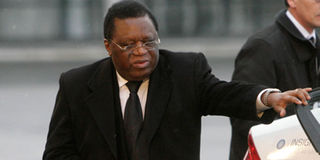Ivory Coast election schedule in doubt

Ivory Coast President Laurent Gbagbo arrives at the morning session of United Nations Climate Change Conference 2009 in Copenhagen December 18, 2009. World leaders worked through the early hours to try and beat a Friday deadline for a deal on cutting emissions and helping poor countries cope with the costly impact of global warming. REUTERS
ABIDJAN, Friday (Reuters) - Strikes by Ivorian judicial staff, technical hitches to voter lists and a wind down for the Christmas holiday may scupper Ivory Coast's plans to hold badly needed post-war elections by early next March.
The polls are crucial if the world's top cocoa grower is to heal the wounds opened by a 2002-3 war that left half of West Africa's former economic hub in the hands of guerrillas trying to oust President Laurent Gbagbo.
Key reforms to the cocoa sector, which supplies 40 percent of the world market, hinge on the vote. Foreign investors are waiting to see whether Ivory Coast can hold peaceful polls.
Poll deadlines have been repeatedly missed since 2005.
A two-week strike by clerks has created a backlog in the courts just as they must rule on challenges to the provisional voter list. They have eight days to do so from Boxing Day.
"One of the problems has always been: are there enough magistrates to do this?" said a diplomat who declined to be named. "And will the magistrates work on December 27th? This week, people in offices start to go back to their homes."
According to the latest agreement, Boxing Day is the end of a 30-day window for the electoral commission to process challenges to the voter list.
Six million voters are registered but a million of them are contested. Around a third of the contested cases have been processed, the U.N. said this week.
'Realistic'
The challenges hinge on questions of nationality, which are deeply divisive and helped fuel the disputes that split the country in two during the civil war.
Still, officials say the current schedule is more realistic than previous missed time frames.
"What we're saying is: it's possible ... it's realistic," said electoral commission spokesman Nicolas Coulibaly.
"We have to respect the text and it says the contestation period ends on the 26th. But other parties must play their roles. It is for the state to give us the resources," he said.
He did not elaborate, but officials doing voter registration have complained about not receiving the funds they need to complete the task on time.
Critics accuse Gbagbo of deliberately slowing things down to extend his mandate, a charge he denies.
"His mandate ran out in October 2005," said Ali Coulibaly, an aide to opposition presidential candidate Alassane Ouattara. "It's causing grave problems. It's not good for investors or the nation to have no visible future."
Gbagbo and his aides insist delays are technical and the vote is currently on schedule.
"The clerk's strike caused some wobbles ... (But) we will draw up the electoral list, distribute cards to voters and we will go to vote at the end of February or start of March," Affi N'Guessan, president of Gbagbo's ruling Ivorian Popular Front (FPI) party was quoted in a local newspaper as saying.
"Everything is going on as it should."




